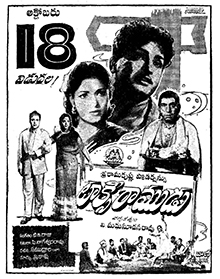Plot
Ramu, a taxi driver, meets his boyhood mate Saroja after ages, and they crush. Ramayya Saroja's father is an employee of Zamindar Janardhana Rao. Whereat, Saroja joins as steno. Impressed at her integrity, Janardhana Rao wishes for her to marry his debauch son Mohan to reform him. So, he steps with the proposal, which they deny. Meanwhile, Ramayya misplaces a huge office amount and attempts suicide as charged. Now, Saroja pleads with Janardhan Rao to pardon when he is constrained to splice Mohan, which corners her. Recognizing their plight, Ramu raised the funds, but it was too late. Soon after the nuptial, Mohan maltreated Saroja despite the birth of progeny. So, Janardhana Rao entrusts totality to the child and expires. Later, Mohan is remorseful after comprehending Saroja's virtue and regenerates when Saroja retrieves his property. Yet, vindictive Naagu, a former mate of Mohan, seeks to extort him, but he boots him. So, Naagu wiles to slay Mohan. Besides being desolate, Ramu becomes an alcoholic who also moves to wipe out Mohan but backs, considering Saroja. At that point, he detects Mohan's threat and loses his eyesight while guarding him. Forthwith, Ramu is admitted and operated on, and it takes a few weeks to recover. Mohan & Saroja accommodate and serve him. Parallelly, enraged Naagu slaughters Mohini Mohan's ex-paramour and incriminates him. Fortunately, before dying, Mohini drafts a letter that shows Mohan's innocence, which Saroja gains but is clutched by Naagu. Discerning it, Ramu forcibly removes the bandage and recoups his vision. At last, he secures Saroja and ceases Naagu but is gravely injured. Finally, he lands at the court and proves Mohan is non-guilty by sacrificing his life.
This page is based on this
Wikipedia article Text is available under the
CC BY-SA 4.0 license; additional terms may apply.
Images, videos and audio are available under their respective licenses.
